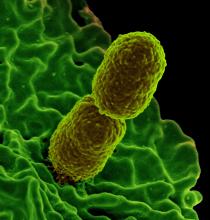
Credit: NIAID
Taurine, which helps the body digest fats and oils, could offer treatment benefit. Scientists studying the body’s natural defenses against bacterial infection have identified a nutrient — taurine — that helps the gut recall prior infections and kill invading bacteria, such as Klebsiella pneumoniae (Kpn). The finding, published in the journal Cell by scientists from five institutes of the National Institutes of Health, could aid efforts seeking alternatives to antibiotics.
Scientists know that microbiota — the trillions of beneficial microbes living harmoniously inside our gut — can protect people from bacterial infections, but little is known abo...
Read More







Recent Comments